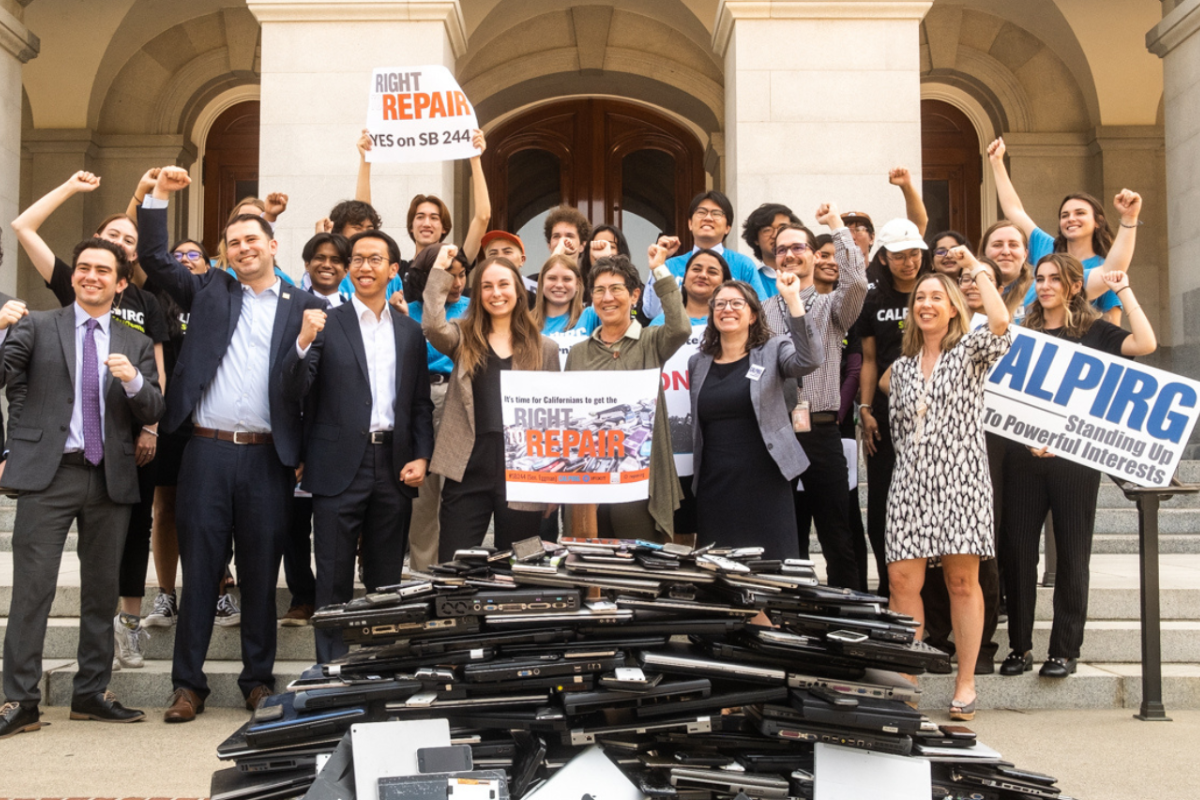
The Golden State’s right-to-repair bill follows the passage of similar bills in Colorado, Minnesota and New York state. | Andy Smith, Courtesy of CALPIRG
California’s right-to-repair bill for electronics awaits Gov. Gavin Newsom’s signature, as does a bill that will update and expand the state’s deposit return system.
Right-to-repair supporters are lauding the years of work it took to get to this point. Jenn Engstrom, state director of the California Public Interest Research Group (CALPIRG), called the bill’s passage a “victory for every Californian” in a press release.
“We can thank the scrappy group of tinkerers, consumers, environmentalists and small business owners who came together to take on the tech industry and win back the right to fix our own stuff,” she said. “When you buy something, you should be able to do what you want with it.”
The California Assembly passed the bill on Sept. 12 with a 65-1 vote, and after the Senate concurred on Sept. 13, it went to the governor’s desk.
As for the bottle bill expansion, SB 353, proposed by Sen. Bill Dodd, passed the Assembly 67-6 on Sept. 14 and is now also on Newsom’s desk.
Diving into SB 353
This bill will expand existing law to cover all sizes of containers for vegetable or 100% fruit juice, effective Jan. 1, 2024.
It will also adjust how state regulators calculate the amount of money paid to bottle and can recyclers, allowing them to adjust the rates every three months instead of annually.
Supporters of the bill noted that changes are needed in processing payment calculation for years.
In an interview with local media, Mark Murray, Californians Against Waste executive director, said the bill will increase consumer opportunities and help stabilize businesses.
“All juice beverages, regardless of container size, will now have a refund, and recycling payments for new and existing recycling centers will be stabilized against scrap market fluctuations,” Murray said in a statement to CBS.
Right-to-repair bill details
SB 244, authored by Sen. Susan Eggman, will require manufacturers to make tools and parts available to repair facilities and owners of certain products on “fair and reasonable” terms.
Eggman said in the press release that SB 244 is “a common sense bill that will help small repair shops, give choice to consumers and protect the environment.”
The bill covers televisions, radios, audio or video recorders or playback equipment, video cameras, computers, photocopiers, refrigerators, freezers, ranges, microwave ovens, washers, dryers, dishwashers, trash compactors and air conditioners. It excludes video game consoles and alarm systems.
For devices with a wholesale price to the retailer of between $50.00 and $99.99, manufacturers are required to make the tools and parts available for at least three years after the last date a product model or type was manufactured. For devices that cost more than $100, the time period is seven years.
OEMs are not required to provide lock or security bypasses under the bill, but repair shops are required to disclose whether they are an authorized repair shop or not for the OEM and if they used any used replacement parts provided by a supplier other than the OEM.
Any person or entity that knowingly violates the law, or reasonably should have known, can be fined $1,000 per day for the first violation, $2,000 per day for the second violation, and $5,000 per day for third and subsequent violations.
Once signed, the law would come into effect July 1, 2024, and would retroactively cover products manufactured for the first time or first sold or used in the state on or after July 1, 2021.
Growing support for repair
Advocates have been pushing for right-to-repair legislation in California for over five years, but similar bills died in the state’s Senate Appropriations Committee. Recently, public support and national momentum have been growing, with Colorado, Minnesota and New York all passing right-to-repair laws in the last year.
Nick Lapis, director of advocacy for Californians Against Waste, said in the press release that it’s “completely unacceptable that consumers are expected to spend thousands of dollars on tech that is intended to be nearly-disposable.”
“Planned obsolescence is inherently unsustainable – in every sense of the word – and this creates an enormous toll on both the environment and our pocketbooks,” Lapis added. “We are incredibly grateful to Senator Eggman for her tenacity in standing up to some of California’s largest companies that have a lot to gain from perpetuating the status quo.”
SB 244 enjoyed backing from 82 independent repair shops, 109 local elected officials, more than 50 environmental and consumer groups, and various others, the press release noted. Both Apple and HP recently threw public support behind the bill.
“For years, Apple has been one of the most visible opponents of repair access while lobbying against giving consumers and independent repair shops what they need to fix devices,” the press release stated. “However, with the Right to Repair movement gaining recognition and support – and leading to laws in other states – Apple has reversed course.”
Elizabeth Chamberlain, director of sustainability at iFixit, said in the press release that it’s great “to have Apple cross the finish line with us in California.”
“It’ll be even better when they’re complying with this law, making repair materials available for everything they sell,” Chamberlain added. “Soon it’ll be up to Californians to do our part and get our stuff fixed when it breaks.”

